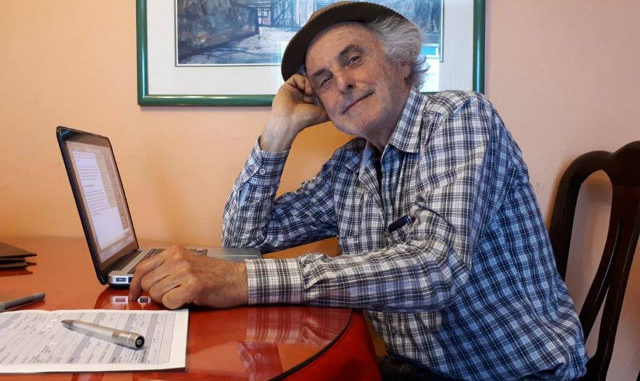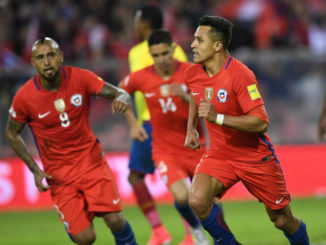
BENJAMIN WITTE
I was neither the first nor the last of the many interns and editors who peopled the office of the Santiago Times during the quarter century founder Steve Anderson captained the ship. But for whatever reason, I stuck around longer than most, and it was with great sadness that I learned yesterday about the automobile accident that ended his life.
My first encounter with Steve came in late 2002, after he had offered me the editor’s job—sight unseen, via e-mail—and I accepted, knowing only that I’d earn about US$500 a month and should show up in Santiago with an AP style guide and a copy of Strunk and White’s The Elements of Style. That it all seemed a bit rushed and loosey-goosey gave me pause for concern, but I was eager for an excuse to return to Chile, so hopped on a plane and flew down from Costa Rica.
Still, after our first meeting, I wondered just how wise my decision really was. It was then that I realized the Santiago Times wasn’t, as I’d imagined, a print paper. It was Internet-based, with a rudimentary website that was only half functioning. “We got hacked,” Steve told me. He also explained that he was living at that moment in Puerto Montt—1,000 kilometers to the south—and that he was recovering still from a recent and quite serious car accident. It had been a very bad year, he said.
I gave the gig a chance, though, and things gradually improved. Some energetic new interns trickled in, as they always did at the Santiago Times. A talented British/Australian writer showed up too, and I asked Steve to hire him as a kind of co-editor. The business couldn’t really afford another paid staff member, but Steve honored my request, and for the next year or so we had a great run. Then the money ran out.
“I can’t afford to pay you both, so one of you has to go,” Steve told us one morning. “I’ll leave it up to you two to decide which one.” And so we did—over a liter of beer, even though it was like nine-something in the morning. The co-editor (still a dear friend of mine) offered to go. But I’d leave too, I decided. A month or so later. The job had run its course, I thought.
We were frustrated and certainly taken aback—especially by the “decide amongst yourselves who stays and goes” part of the equation. And yet, neither of us was really surprised, because even then, we’d seen enough of Steve and his herky-jerky management style to know that this was precisely the kind of situation that could and would, as it turned out, unfold.
We couldn’t really be angry either. Or at least not stay angry. Because again, with Steve, what you saw is what you got. He was passionate about his project, but not always clear about how to make it grow. Often he’d have a new idea, and then charge ahead. And in those cases, there’d be a flurry of positive changes—new computers maybe, a new paid staff person, a larger office space. But then a particularly capable group of interns would move on, money would run scarce, the whole operation would contract, and we’d be back to square one, or so it felt.
I know this because later I joined Steve for a second, longer stint. What never varied, though, was his fighting spirit. A feisty advocate for the underdog, he was always chomping to champion a good cause—demanding accountability for human rights violations, defending the environment, shining a light on corruption and hypocrisy.
The Santiago Times was his platform, and he committed himself tooth-and-nail to making it survive, if not prosper. And in the meantime, the interns, editors, photographers and other collaborators kept coming through. They kept using Steve’s office and humble little publication as a landing point for early-career, working-abroad experiences, and as a launching pad for further adventures and professional endeavors.
If there was a method to Steve’s madcap approach, it was that with each new idea he had for the Santiago Times, with each new push to improve or revive it, he bought the business a little more time. Months turned into years and then decades. And all the while, people like myself were given an opportunity to work and learn—in large part through trial and error, because although Steve had things to teach, he also gave us space to teach ourselves.
It was his special tenacity, though, that kept the whole thing going, that gave so many people the chance, year after year, to develop their skills. We had fun too. So much fun. The office on Av. Santa María produced lasting, globe-spanning friendships, even love stories. And that was also part of Steve’s gift to us all.
He was an unabashed eccentric. Smart. Complicated. He had an entrepreneurial spirit but no real nose for business. Steve was a lawyer who wrote about politics and fruit exports. An editor with a penchant for typos. Part idealist, part cynic. A campaigner with no patience for diplomacy. He was perpetually cash-strapped, but generous. He was impulsive and impatient at times, but also deeply committed—to his various projects and causes, and to his family and colleagues. He was a teacher and a mentor. A doting father. A friend.
Goodbye Steve. Paz. And thank you.
The Santiago Times’ founding publisher Steve Anderson dies in Chile accident



